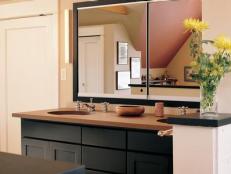Composite Countertops

Composite countertops look and perform like solid surface—and you'd never guess most are made out of paper. Along with being impervious to water, the surface inhibits bacteria and resists stains, scratches and heat. Warm to the touch, composite countertops lend a rich, natural feel and gain character with age.
The eco-friendly surface, made from natural fibers and resins, is one of the greenest options available. Consider these factors when choosing composite:
- Measurements: Vary by manufacturer. Generally, bath countertops run from three quarter inch thick to an inch and a half thick. Choose from a wide variety of edge treatments.
- Colors: Much like solid surface, composite comes in a range of earth tones, from chocolate brown to denim blue. The color runs all the way through.
- Variations: Because it's a natural product, composite countertops can contain variations, adding to their warm, earthy appearance.
- Patina: Like wood, composite surfaces tend to darken over time from oxidation and sunlight exposure. While many appreciate this character-rich appearance of age, you can slow the process by employing ultra violet shields.
- Versatility: Subtle in appearance, composite countertops can blend with virtually any décor, whether contemporary or traditional, Asian-inspired or country.
- Practicality: The durable surface has been used for years in industrial applications, so it can handle what the busiest bathroom dishes out. The surface is water-resistant and cleans up easily. Most types resist heat up to 350 degrees. Light refinishing can take care of most scratches and nicks.
- Sink types: Options include drop-in, undermount and vessel styles.
- Eco-friendly features: Composite usually includes recycled material or material that would otherwise go to waste. Most manufacturers rely on water-based and non-petroleum-based phenolic resins and steer clear of VOCs (including formaldehyde) to minimize emissions for better air quality. Composite countertops, while not recyclable, can be recut and retooled for future use.







































